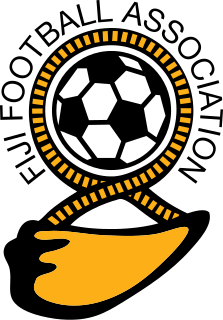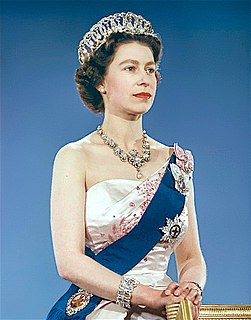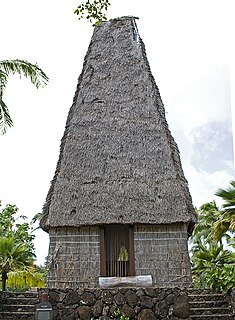Related Research Articles

Fiji, officially the Republic of Fiji, is an island country in Melanesia, part of Oceania in the South Pacific Ocean. It lies about 1,100 nautical miles northeast of New Zealand. Fiji consists of an archipelago of more than 330 islands—of which about 110 are permanently inhabited—and more than 500 islets, amounting to a total land area of about 18,300 square kilometres (7,100 sq mi). The most outlying island group is Ono-i-Lau. About 87% of the total population of 883,483 live on the two major islands, Viti Levu and Vanua Levu. About three-quarters of Fijians live on Viti Levu's coasts: either in the capital city of Suva; or in smaller urban centres such as Nadi—where tourism is the major local industry; or in Lautoka, where the sugar-cane industry is dominant. The interior of Viti Levu is sparsely inhabited because of its terrain.
Fijian mythology refers to the set of beliefs practiced by the indigenous people of the island of Fiji. Its gods include Degei, a serpent who is the supreme god of Fiji. He is the creator of the (Fijian) world. He judges newly dead souls after they pass through one of two caves: Cibaciba or Drakulu. A few he sends to paradise Burotu. Most others are thrown into a lake, where they will eventually sink to the bottom (Murimuria) to be appropriately rewarded or punished.
Pulotu is the resting place of those passed on in the Polynesian narrative of Tonga and Samoa, the world of darkness "lalo fonua".
In pre-Christian Fijian mythology, Murimuria is part of the underworld. According to Fijian religion, after a man dies, his soul is brought over a stretch of water by a ferryman, and has to face many dangers on the other side by going through the Path of the Souls. For unmarried men, there seems to be no chance of surviving this path, because even if they escape the Great Woman, they would be killed by the monster Nangganangga, since no one ever got away from it, while married men could survive, if they withstand the Pandanus tree and the armed giant Killer of Souls. The survivors are judged by the god called Degei. Those who had the favor of Degei are instructed not to try to cross the lake. These go to Burotu. The rest inevitably try cross the lake by a boat that always capsizes. They eventually sink to the bottom, Murimuria, and are rewarded and punished appropriately.
In Fijian mythology, Nabagatai is a village on the road to Bulu, where the souls of the dead live.
In Fijian mythology, Degei, enshrined as a serpent, is the supreme god of Fiji. He is the creator of the (Fijian) world, fruits, and of men and is specially connected to Rakiraki District, Fiji. He judges newly dead souls after they pass through one of two caves: Cibaciba or Drakulu. A few he sends to paradise Burotu. Most others are thrown into a lake, where they will eventually sink to the bottom (Murimuria) to be appropriately rewarded or punished.

Fijian is an Austronesian language of the Malayo-Polynesian family spoken by some 350,000–450,000 ethnic Fijians as a native language. The 2013 Constitution established Fijian as an official language of Fiji, along with English and Fiji Hindi, and there is discussion about establishing it as the "national language". Fijian is a VOS language.

Articles about people, places, things, and concepts related to or originating from Fiji, include:

The Fiji national football team is Fiji's national men's team and is controlled by the governing body of football in Fiji, the Fiji Football Association. The team plays most of their home games at the ANZ National Stadium in Suva.

In Fijian mythology, Bulu is a name for the 'world of spirits'. In the month called Vula-i-Ratumaibulu, the god Ratumaibulu comes from Bulu, the world of spirits, to make the breadfruit and other fruit trees blossom and yield fruit. Ratumaibulu is a god of great importance who presides over agriculture.

The monarchy of Fiji arose in the nineteenth century, when native ruler Seru Epenisa Cakobau consolidated control of the Fijian Islands and declared himself King or paramount chief of Fiji. In 1874, he voluntarily ceded sovereignty of the islands to Britain, which made Fiji a Crown colony within the British Empire.

The Fiji national cricket team is the men's team that represents the Republic of Fiji in international cricket. Fiji has been an associate member of the International Cricket Council (ICC) since 1965, although the team's history goes back to the late 19th century.

Fiji Hindi is an Indo-Aryan language spoken by Indo-Fijians, though a few speak other languages at home. It is an Eastern Hindi language, considered to be a dialect of Awadhi that has also been subject to considerable influence by Bhojpuri, other Bihari dialects, and Hindustani. It is Apabhraṃśa of Standard Hindi. It has also borrowed some words from the English and Fijian languages. Many words unique to Fiji Hindi have been created to cater for the new environment that Indo-Fijians now live in. First-generation Indians in Fiji, who used the language as a lingua franca in Fiji, referred to it as Fiji Baat, "Fiji talk". It is closely related to Caribbean Hindustani and the Bhojpuri-Hindustani language spoken in Mauritius and South Africa. It is largely mutually intellegible with the languages of Bhojpuri, Magahi, etc. of Bihar and the dialects of Hindi of eastern Uttar Pradesh, but differs in phonetics and vocabulary with Modern Standard Hindi.
Ayodhya Prasad Sharma was an Indo-Fijian farmers' leader and politician. He formed the most successful farmers' union in Fiji and forced the Colonial Sugar Refining Company to make concessions to farmers after 60 years of total control over Fiji's economy. However, other Indo-Fijian leaders formed rival unions and his initial success was not repeated. He also served as a member of the Legislative Council between 1953 and 1959.
The Tu'i Pulotu is believed to be the head of an ancient group of people that settled in Pulotu (Fiji) during the Lapita period. It was said that the Tui Pulotu originally came from the Fiji Islands and led the Pacific Islands from the early BC era to the first 800 years AD. Many people tried to associate Pulotu with Burotu because of the different pronunciations within Tonga, Samoa and Fiji. And we all know that Burotu in Fiji was the Burotukula which used to be seen near Matuku in Lau.

Religiously, Fiji is a mixed society with most people being Christian, with a sizable Hindu (27.9%) and Muslim (6.3%) minority, according to the 2007 census. Religion tends to split along ethnic lines with most Indigenous Fijians being Christian and most Indo-Fijians being either Hindu or Muslim.
The Fiji national under 20 rugby team is for Fijian rugby union players aged 20 or under on January 1 of the year during which they are selected.
Seremaia "Jerry" Burotu in Tavua is a Fijian rugby union footballer. He currently plays for French team Provence Rugby and the Fiji national rugby union team and usually plays as a Number 8, Inside centre or wing.

The Fiji women's national cricket team is the team that represents the country of Fiji in international Women's cricket matches. Fiji has been an associate member of the International Cricket Council (ICC) since 1965, although the team's history of the game in the country goes back to the late 19th century.
Lutunasobasoba is considered to be one of the ancestors of the Fijian (iTaukei) people, along with Degei.
References
- ↑ T. Williams, J. Calvert, Fiji and the Fijians, Heylin, 1858.